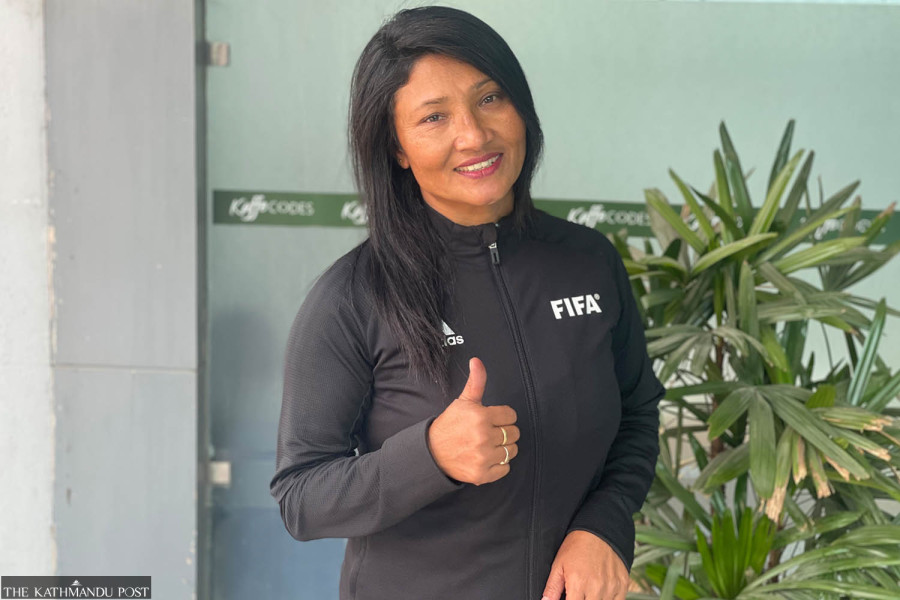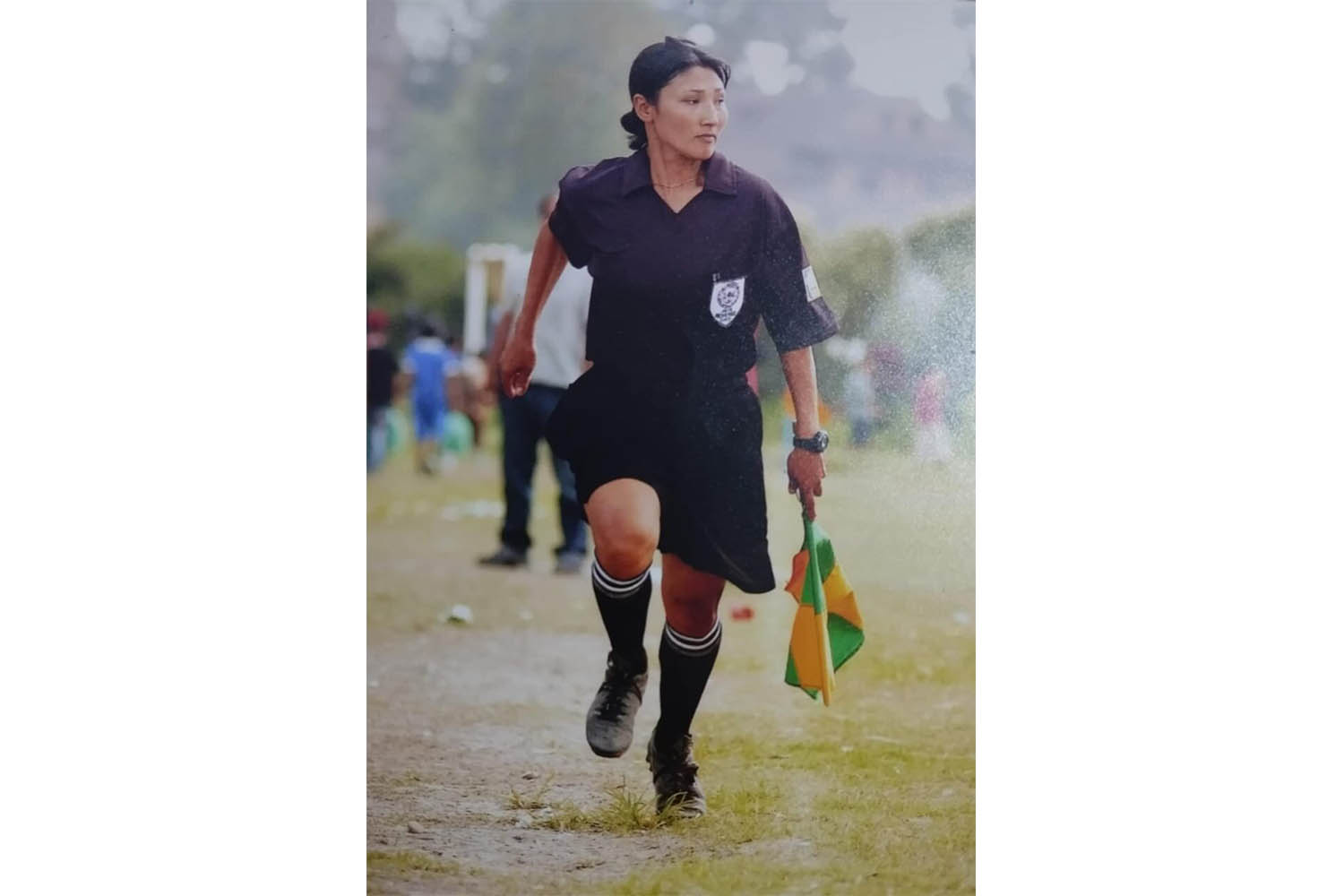Culture & Lifestyle
Passion and perseverance
From being a national athlete to becoming a SAFF referee assessor, Bina Shrestha’s journey defies societal expectations and family pressures.
Sanskriti Pokharel
When Bina Shrestha tried to make it in sports in the 1990s, she was pressured to marry. In our part of the world, marriage for women often means putting personal aspirations on hold, which steers them away from the paths they envisioned.
However, for Shrestha, marriage became a chapter, not a conclusion. Currently serving as a SAFF referee assessor, the General Secretary of the Women’s Association at the All Nepal Football Association, and a board member of the Sports Council, Shrestha’s dedication to sports has never wavered. A former FIFA assistant referee, ex-sports teacher at Modern Indian School, and an athlete in football and athletics, she has represented Nepal at national and international championships, earning numerous accolades.
Shrestha’s journey began when she was just 9 years old. During her winter and summer vacations, her uncle would take her to gymnastics classes, sparking her passion for sports. What started as a casual activity soon became a serious pursuit as she began participating in district-level competitions.
Her dedication paid off, and by age 14, Shrestha reached the national stage. Her first milestone was participating in the 27th National Games held in Mahendranagar in 1988.
At that tender age, if someone asked Shrestha what she wanted to be when she grew up, her answer was always the same—a sportsperson.
However, in those days, seeing girls actively involved in sports was rare. Shrestha faced resistance from her own family, particularly her grandmother, who disapproved of her passion. “Being a girl, you should not be involved in sports,” her grandmother would say, often scolding Shrestha and her uncle. Despite this, her uncle remained supportive, taking her to practice with hushed and cautious actions, ensuring her dream stayed alive.
In 1994, Shrestha participated in the 5th Junior World Championship held in Lisbon, Portugal. Being so far away for the first time, she used to cry, saying she wanted to go home. She did not like the food, and she missed home.
A few years later, Shrestha encountered an unexpected turning point: marriage. At just 21, family pressure steered her into a union she wasn’t ready for, as her heart remained set on her career. Yet, Shrestha considers herself fortunate. “Unlike other in-laws back then, mine never stopped me from doing what I loved. They gave me the freedom to pursue my athletic dreams,” she shares. “I got a home that supported me and never held me back.”
Shrestha welcomed her first child a year after marriage, inviting a pause in her career. But even motherhood couldn’t keep her away for long. Just two to three months after giving birth, she returned to training with the same determination she had.
“My in-laws, out of concern, would urge me to rest, but I couldn’t wait to get back to normal and resume training,” she recalls. “By the fifth month, I was training hard, regaining my fitness, and by the sixth month, I was competing again. My dedication to sports was so deeply rooted that no physical or emotional challenge could stop me.”
However, the challenges were immense. As a breastfeeding mother, Shrestha faced the physical toll of training while balancing her newborn’s needs. “It broke my heart every time I had to throw away the milk that leaked during training, knowing my baby might be longing for it,” she says. Hearing a baby cry would remind her of her daughter at home, hurting her.
I don’t know how I managed to stay physically and emotionally strong during those days, but I endured it,” she reflects.
When Shrestha was in India for a game, she saw PT Usha (an Indian sports administrator and retired track and field athlete). Seeing the Indian athlete win despite being a married woman with kids inspired Shrestha. “Her life story inspires and resonates with mine, making me feel like I am not alone in balancing many roles.”
Her in-laws made things easier for her. They looked after her newborn daughter while she was out playing. However, balancing many roles—sportsperson, mother, wife, and daughter-in-law—was not a cakewalk. Going out for training and turning heedless to the household chores felt unsettling to her.
Shrestha woke up at 4 am to complete all the household chores, feed her daughter, cook for her family, and then go to the stadium for her morning practise. Following the timetable and being punctual was vital for her. After the training, Shrestha became dutiful to her household, managing chores, cooking, and caring for her daughter.

Transitioning from athletics to becoming a referee brought new challenges. The role demanded more movement, more running, and intensive training. There were exams to pass, fitness tests, visual assessments, and further training sessions to complete. She held firmly to her 4 am routine to balance it all, ensuring she excelled in her household responsibilities and professional goals.
After training, while her teammates indulged in hotel stays, meals, and rest, she would rush home to care for her kids and prepare dinner. Yet, she never saw these household chores as a burden. Instead, she considered them bonus training sessions contributing to her fitness goals. Experts emphasise the importance of at least an hour of rest to recharge the body. Despite her limited sleep and rest, her drive and dedication energised her. She refused to let fatigue or weakness slow her down.
As a child, Shrestha often endured scoldings from her grandmother, who voiced discriminatory beliefs like, “Women shouldn’t do this or that.” Over time, however, those archaic views dissipated as Shrestha carved a place for herself in her field.
Fortunately, Shrestha's journey was free from gender-based discrimination. “I received the same training and rewards as my male counterparts,” she shares. “When I first trained as a referee, I was the only woman in the group. I trained alongside men and successfully passed the fitness test designed for male referees. That experience reinforced that my gender was never a limitation or a weakness.”
Training is a crucial part of Shrestha’s life. During the Covid pandemic, she trained at home. Her training spots used to be her room and terrace. She used to run from one corner of the room to another.
As a FIFA referee, Shrestha must pass annual tests to renew her badge yearly. For her, no day felt complete without training. On days when household responsibilities occupied her time, she would run in the streets at night after finishing dinner preparations. Shrestha managed to train for these tests entirely from home. She exemplifies the saying, “Where there’s a will, there’s a way.”
Through her dedication, Shrestha achieved a historic milestone as the first Nepali referee to officiate in the FIFA Women’s Olympic Football Qualifying Round.
Her commitment also earned her numerous accolades and awards, among which the 1999 Suprabal Gorkha Dakshinbahu prize, presented by the late King Birendra Bir Bikram Shah Dev, holds a special place in her heart. Reflecting on the moment she received this honour, Shrestha shares, “I felt like I had won the world when the late King handed me the prize.” Even today, the memory of that day brings her tears of joy.




 18.12°C Kathmandu
18.12°C Kathmandu















